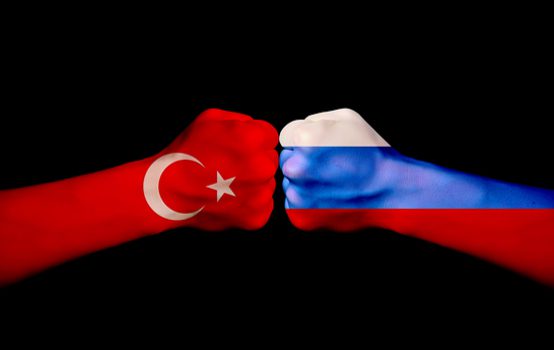Don’t Fear the Terror in Turkey

Russian Ambassador to Turkey Andrei Karlov has been shot dead in Ankara by an assailant who was subsequently killed by police. Sources who were present at the scene report that the attacker, dressed in a suit and brandishing a handgun, shouted in Arabic “Allahu Akhbar” followed by screams in Turkish, “Don’t forget Aleppo! Don’t forget Syria! Stand back! Stand back! Only death will take me out of here. Anyone who has a role in this oppression will die one by one.” Moscow, Ankara, and the State Department in Washington are all regarding the killing as a terrorist act.
Ankara’s mayor and the Turkish Interior Minister have confirmed that the assailant was a 22-year-old plainclothes police officer who used his credentials to enter the exhibition hall where the ambassador was opening an exhibition of Russian photographs. The Turkish media is reporting that there was security at the building, both inside and outside, but there appear to have been no special measures like metal detectors in place in spite of the fact that there have been large demonstrations in both Istanbul and Ankara over the past week protesting Russian actions in Aleppo. Some of the demonstrations have occurred in front of the Russian embassy and consulates so security was already at a high level.
Most of the demonstrators against Russia have reportedly been Turks, nominally supporting their own country’s foreign policy and ostensibly responding to reports of both Russian and Syrian brutality. Intelligence sources suggest that there has been no indication whatsoever that radical groups like ISIS or al-Nusra had infiltrated the gatherings, though both groups are known to have active cadres in Ankara and Istanbul. Turkey is also now home to more than 2 million refugees from the fighting in Syria but they have been careful to remain apolitical and are monitored closely by the Turkish intelligence service MIT.
Turkish television, which is partially state run and is careful not to offend the government, is speculating that the murder will disrupt a planned Turkish-Russian-Iranian foreign ministers meeting scheduled to start tomorrow in Moscow to discuss the situation in Syria now that Aleppo has fallen. Russia and Turkey are nominally on opposite sides regarding what to do about the government in Damascus, with Moscow continuing to support Bashar al-Assad while Ankara insists that he must be removed.
In reality, Turkey has been shifting closer to the Russian position as the facts on the ground have changed, now stressing the need to take steps to prevent the development of any kind of Kurdish fiefdom along the border as the top priority. Russia is apparently willing to participate in shaping resettlement policies that will satisfy Turkish concerns. And the inclusion of Iran in the discussion is a sign that regime change in the near term is no longer being contemplated as a sine qua non. Iran can also be counted on to share Turkey’s concerns over regional separatism as it has its own problem with an indigenous Kurdish terrorist group called the PJAK.
Turkey has also been undergoing fundamental political shifts. President Recep Tayyip Erdogan has grown more estranged from Washington and the Europeans due to the negative reaction to his crackdown on alleged supporters of the July coup. That his foreign minister will be meeting with Russia in Moscow to discuss Syria is significant. The Turkish media has been cautiously optimistic about Donald Trump, possibly reflecting a government expectation that he will give Ankara a free hand in dealing with what it perceives to be its Kurdish problem, but Erdogan continues to warn that his country’s alignment with the west is not a given. He has made clear that cultivating warmer relations with Moscow and Beijing is a serious option for Ankara, so it will behoove him to take whatever steps are necessary to reassure Vladimir Putin. Erdogan has already telephoned the Russian president to offer his condolences on the killing and it is likely that the government will declare a state of official mourning over the Ambassador’s death.
In the wake of the killing, most diplomatic missions in Turkey are now in a state of security lockdown. The United States Embassy and several European countries have already issued travel advisories in the wake of recent terrorist bombings, suggesting that visitors should exercise caution. These warnings will surely increase in number, further damaging Turkey’s already reeling tourism industry, so it is to be expected that the government will take steps to convince potential visitors that the country is safe.
Russia will also likely proceed cautiously. Its government will clearly consider the fact that Ambassador Karlov could have been provided better protection and will discuss specific steps that might be taken regarding treatment of its diplomatic staff, but its objections will be largely pro forma and it will likely not press on the issue very hard as the improved relationship with Ankara is also in its own interest. Turkey, in spite of considerable political turmoil since the 1980s, can also argue that it has an excellent record on protecting foreign diplomats.
Both Russia and Turkey will express chagrin over the assassination and their bilateral relationship will undergo some strain but they will also be eager to put the incident behind them. If anything, the death of Ambassador Karlov might well accelerate a rapprochement on what to do about Syria, leaving the United States even more isolated in terms of its demand that al-Assad be compelled to step down.
Philip Giraldi, a former CIA officer, is executive director of the Council for the National Interest.
Comments